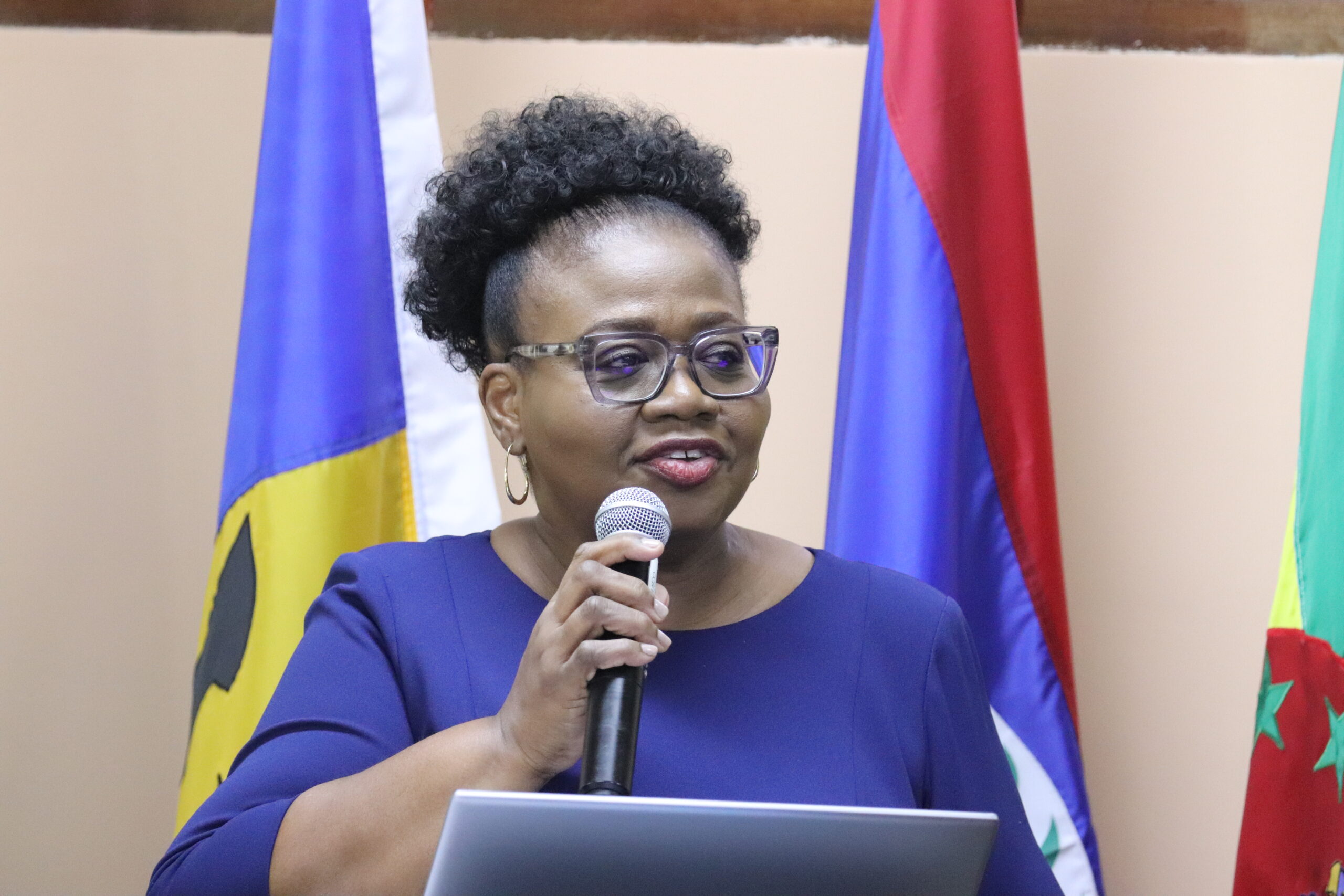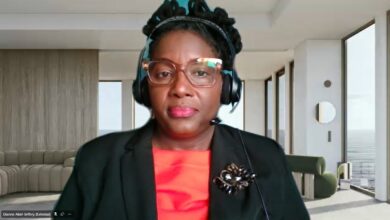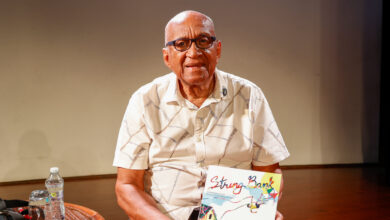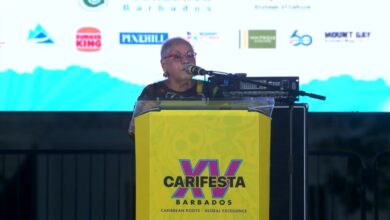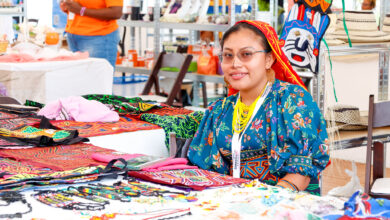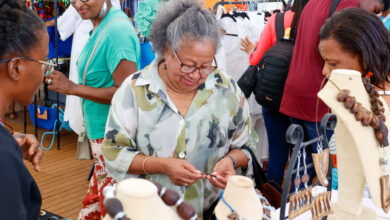There is now a significant increase in regional and global awareness of the value and importance of the creative industries, and how they can contribute to sustainable development in small countries in the global South. These views were shared by Beverly Harry-Emmanuel, Advisor, Social Development at the CARICOM Secretariat at the opening ceremony of the Thirty-First Meeting of the Regional Cultural Committee (RCC), held today, Thursday 26 June, at the Lloyd Erskine Sandiford Centre in Bridgetown, Barbados.
“These countries are recognised internationally for the excellence, richness and diversity of their cultural expressions,” stated Ms Harry -Emmanuel.
She added “Directors of Culture have advocated for greater attention to and allocation of resources to the creative sector, resulting in significant changes in the enabling environment in the Region in terms of cultural policy, data collection, training, legislation and funding mechanisms at national and regional levels.”
The RCC has been instrumental in shaping cultural policy at the national and regional levels, by advising Ministers of Culture on the many issues on the Region’s agenda and infusing the regional culture programme with new ideas, new approaches and new attitudes.
Please read Mrs. Harry-Emmanuel’s remarks below.
Remarks by Mrs. Beverly Harry-Emmanuel
Advisor, Social Development
CARICOM Secretariat
Thirty-First Meeting of the Regional Cultural Committee (RCC)
Opening Ceremony
26 June, 2025
- Mrs. Michelle Maynard, Deputy Permanent Secretary, Division of Culture
- Permanent Secretaries and Directors of Culture
- Ms. Carol Roberts, Festival Director
- Members of the Host Country Management Committee
- Members of the Interim Festival Directorate
- Members of Staff of the CARICOM Secretariat
- Members of the Media
It is my pleasure to warmly welcome you to the Thirty-First Meeting of the Regional Cultural Committee (RCC), on behalf of the Secretary-General of CARICOM, Dr. Carla Barnett.
The RCC has an important advisory role to perform, that you and officials who have served before you, have provided for over three decades to CARICOM Ministers of Culture, who meet periodically in the Council for Human and Social Development (COHSOD). This body has done so consistently and is well respected as one that has provided sound expert advice, since its first meeting in 1987 in Trinidad and Tobago.
A very special welcome to the representatives of Member States who are attending the RCC for the first time. It is a pleasure to welcome you into the CARICOM family of Directors of Culture, and I hope you will find participation in the RCC a rewarding experience. A warm welcome also to members of the Interim Festival Directorate, the regional management body for CARIFESTA, who met yesterday with the Host Country Management team to provide their support and expertise in preparations for CARIFESTA.
A very special thank-you to the Government of Barbados for hosting these meetings this week, for the warm hospitality that we have received since our arrival, and the excellent arrangements put in place for the Nineteenth Meeting of the Interim Festival Directorate and the Thirty-First Meeting of the Regional Cultural Committee.
I think it is evident that the international and regional context in which the RCC has been working has changed fundamentally since 1987 when this body first met in Trinidad and Tobago.
There is now significantly increased regional and global awareness of the value and importance of the creative industries, and the ways in which they can contribute to sustainable development in small countries in the global South. These countries are recognized internationally for excellence, richness and diversity of their cultural expressions.
Directors of Culture have advocated for greater attention to and allocation of resources to the creative sector resulting in significant changes in the enabling environment in the region in terms of cultural policy, data collection, training, legislation and funding mechanisms at national and regional levels.
It is with this awareness of the tremendous value of the creative industries to our region that the project “Creative Caribbean: An Ecosystem of ‘Play’ for Growth and Development” was designed by the CARICOM Secretariat, The University of the West Indies and UNESCO, to provide much needed support to creatives in CARICOM. Currently, targeted grant support is being disbursed to 78 creatives and cultural entrepreneurs in 15 countries in the region and the programme is also providing vital resources to develop the enabling environment for the creative sector.
This includes the development of national registries of artists; draft model legislation for Creative Industry Development Acts in Member States to protect and incentivize the sector; development of a model satellite account for data collection and management; and the development of a regional creative content hub to facilitate innovation and creativity. The RCC will receive important updates in relation to the successes of the project to date.
The Caribbean Development Bank’s Creative and Cultural Industries Innovation Fund (CIIF) continues to provide valuable grant support for creative entrepreneurship in the region, for data collection, innovation and job creation. It is welcome news that the Caribbean Development Bank decided to recapitalize and continue the operations of the Creative and Cultural Industries Innovation Fund (CIIF) beyond the initial investment of US$2.6 million which established the fund in 2018, and which facilitated the first cycle of funding that ended in 2023. We look forward to the Creative and Cultural Industries Innovation Fund’s (CIIF) update on this important initiative.
The matter of Reparations for Native Genocide and Enslavement continues to be placed high on the agenda of CARICOM Heads of Government and the region. We continue to pursue reparations from Europe for over 400 years of slavery and colonialism, which has resulted in the systemic underdevelopment of the region and persistent poverty in many communities. The observance by the United Nations of the Second International Decade for People of African Descent (2025-2034) and the declaration by the African Union of 2025 as the year for ‘‘Justice for Africans and People of African Descent Through Reparations” both present valuable platforms for increased advocacy and awareness of the reparations agenda that has been championed by the CARICOM Reparations Commission for 12 years since 2013.
Steps are being taken by our Heads of Government, to form a coalition with the African Union for increased joint advocacy on this important human rights movement for justice and development. Ministries with responsibility for Culture continue to have an important role to play in facilitating public education and dialogue on reparatory justice and enabling the people of the region to reclaim and value aspects of their cultural heritage which were either lost or denigrated through centuries of oppression.
Ladies and gentlemen, I also bring to your attention the important work being undertaken by UNESCO in collaboration with the Caribbean Disaster Emergency Management Agency to build the resilience of the culture sector to disasters and climate change. This work is timely and vital to the preservation of national patrimony. Mitigation and recovery strategies will also be presented for discussion and the guidance of Directors.
However, the priority that will consume the attention of the RCC is preparations for the Fifteenth Caribbean Festival of Arts, scheduled for 22 -31 August 2025 in Barbados. Directors of Culture and Members of the Interim Festival Directorate will engage with the Host Country team on arrangements that are key to a successful event, from artistic concept to logistics, venues, marketing, customs, security, accreditation and accommodation. Barbados is in an advanced stage of preparations for what promises to be a diverse and exciting ten-day event. This is an important opportunity for participating countries to visit venues, scout accommodation and gain a range of information to help finalize their plans for CARIFESTA. The RCC will devote significant time to discussions with Barbados to ensure a successful and enjoyable event.
This Thirty-First Meeting of the RCC provides yet another opportunity for reflection, review and renewal to ensure that national and the regional culture agendas meet the needs of the members of the culture sector who you serve. The RCC has been instrumental in shaping cultural policy at the national and regional levels and infusing the regional culture programme with new ideas, new approaches and new perspectives.
It is a pleasure for me to be here with you, and I take this opportunity to wish us all a productive meeting.
Thank you.

